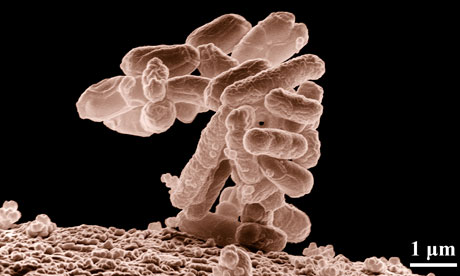E. coli bacteria Esherichia coli and known as E col condensing a cell multiple names and attributes even if their home is the natural human and animal intestines. Most types of bacteria and a deposit, but is responsible for the synthesis of vitamin K necessary for the process of blood clotting and also contributing also to build bone and kidney tissue.

Also responsible for the protection of the human gut than other types of harmful bacteria to address them and forced them to withdraw was received was killed in the fighting.
- can the bacteria E. coli that live live for a limited time outside the human gut, which makes them an ideal target to estimate the proportion of environmental pollution if they are found in nature as well as the breed is easy if conducted in the laboratory on private farms in order to study its kind and their properties and the degree of sensitivity to antibiotics appears
Under the microscope in the form of bacillus a small high-precision types, including the most important causes serious food poisoning and is symbolized by the Serolype o157: H7, including also what is causing the inflammation and urinary infection or cause inflammation of the membranes of the brain in infants.
- Newly use those beneficial bacteria especially E Coil strain Nissle 1917 and known as the Mutaflor probativ in products used to treat serious diseases such as intestinal bowel syndrome or Crohn's disease.
- thanks to the discovery of the beneficial bacteria that are harmful to the pediatrician, of German origin and those interested in the science of living cells Theodore Aichirc 1885 Thedor Escherich.

Also responsible for the protection of the human gut than other types of harmful bacteria to address them and forced them to withdraw was received was killed in the fighting.
- can the bacteria E. coli that live live for a limited time outside the human gut, which makes them an ideal target to estimate the proportion of environmental pollution if they are found in nature as well as the breed is easy if conducted in the laboratory on private farms in order to study its kind and their properties and the degree of sensitivity to antibiotics appears
Under the microscope in the form of bacillus a small high-precision types, including the most important causes serious food poisoning and is symbolized by the Serolype o157: H7, including also what is causing the inflammation and urinary infection or cause inflammation of the membranes of the brain in infants.
- Newly use those beneficial bacteria especially E Coil strain Nissle 1917 and known as the Mutaflor probativ in products used to treat serious diseases such as intestinal bowel syndrome or Crohn's disease.
- thanks to the discovery of the beneficial bacteria that are harmful to the pediatrician, of German origin and those interested in the science of living cells Theodore Aichirc 1885 Thedor Escherich.




